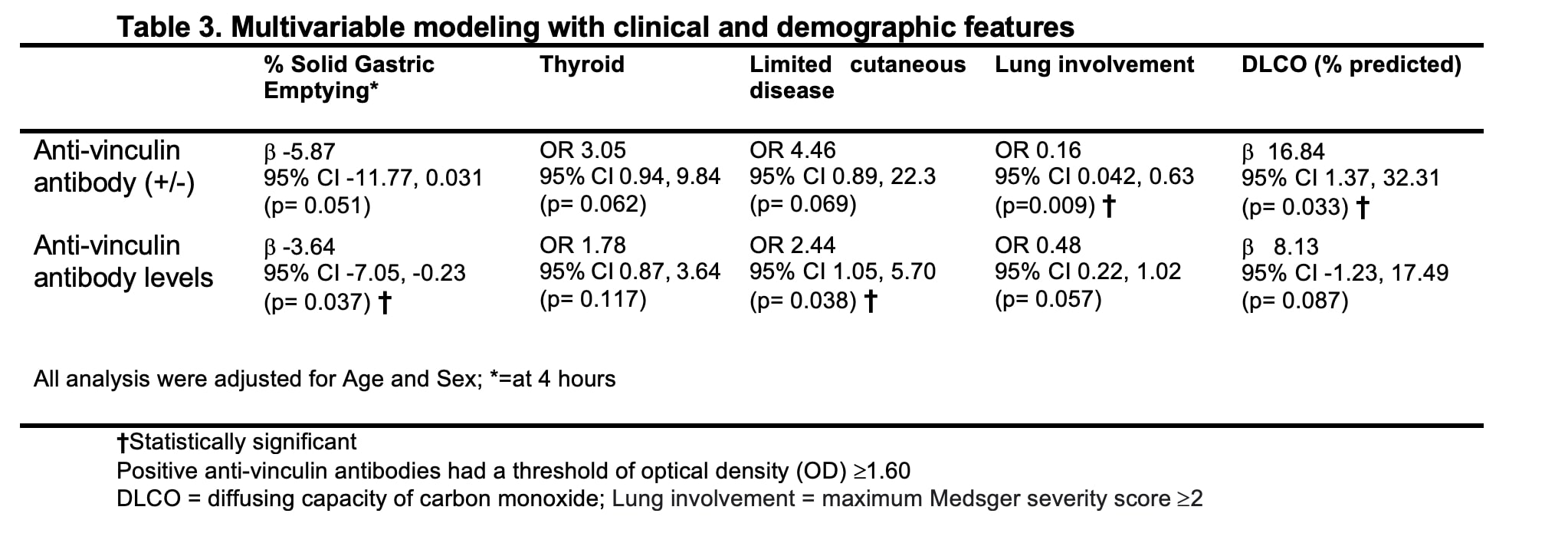Back
Poster Session B
Fibrosing rheumatic diseases (scleroderma, MCTD, IgG4-related disease, scleroderma mimics)
Session: (1046–1070) Systemic Sclerosis and Related Disorders – Clinical Poster I
1068: Anti-vinculin Antibodies in Systemic Sclerosis: Associations with Slow Gastric Transit and Extra-Intestinal Clinical Phenotype
Sunday, November 13, 2022
9:00 AM – 10:30 AM Eastern Time
Location: Virtual Poster Hall
- MH
Maria Herran, MD
School of Health and Sciences - Universidad del Rosario
Bogota, Colombia
Abstract Poster Presenter(s)
Maria Herran1, Brit Adler2, Jamie Perin3, Walter Morales4, Mark Pimentel5 and Zsuzsanna McMahan6, 1School of Medicine and Health Sciences, Universidad del Rosario, Bogotá, Colombia, 2Johns Hopkins University, Division of Rheumatology, Baltimore, MD, 3John Hopkins University, Baltimore, MD, 4Medically Associated Science and Technology (MAST) Program, Cedars-Sinai, Los Angeles, CA, 5Karsh Division of Gastroenterology and Hepatology, Cedars-Sinai, Los Angeles, CA, 6Johns Hopkins Rheumatology, Baltimore, MD
Background/Purpose: The gastrointestinal tract is commonly affected in systemic sclerosis (SSc). Prior studies have reported an association between higher levels of anti-vinculin antibodies and gastrointestinal symptom severity in SSc. Our aim was to determine whether anti-vinculin antibodies associate with objective measures of gastrointestinal dysmotility in SSc, and to determine the clinical phenotype associated with these antibodies.
Methods: Sera from 88 well-characterized patients who fulfilled the criteria 2013 ACR/EULAR criteria and the 1980 American College of Rheumatology (ACR) criteria for SSc in our cohort were assayed for anti-vinculin antibodies by enzyme-linked immunosorbent assay (ELISA). Whole gut scintigraphy, gastrointestinal symptom scores, and clinical features of SSc were compared with and without second generation anti-vinculin antibodies.
Results: Twenty-two out of 88 (25%) patients in our cohort had anti-vinculin antibodies. Anti-vinculin antibodies were more prevalent in patients with slow gastric transit than in patients without (37% vs. 21%). In the univariate analyses, higher levels of anti-vinculin autoantibodies were associated with a reduction of gastric emptying (β coefficient -3.41, 95% CI -6.72, -0.09), more limited cutaneous disease (OR 5.0, 95% CI 1.04, 23.9) and more thyroid disease (OR 3.2, 95% CI 1.02, 10.01). Patients were less likely to have lung involvement based on the Medsger Severity Score ³2 (OR 0.19, 95% CI 0.05, 0.68) and had a higher percent predicted diffusion capacity for carbon monoxide (DLCO) (β coefficient 15.3, 95% CI 0.12, 30.5). The association between anti-vinculin antibodies levels and slow gastric transit (β coefficient -3.64, 95% CI -7.05, -0.23) remained statistically significant in our multivariable model.
Conclusion: Anti-vinculin antibodies associate with gastric transit delays and other clinical features of SSc and may provide insight into slow gastric transit and an associated phenotype in SSc.
.jpg) Table 1. Evaluation of associations between SSc clinical characteristics and anti-vinculin antibodies
Table 1. Evaluation of associations between SSc clinical characteristics and anti-vinculin antibodies
.jpg) Table 2. Linear regression analyses evaluating the association between anti-vinculin antibody levels and gastrointestinal transit
Table 2. Linear regression analyses evaluating the association between anti-vinculin antibody levels and gastrointestinal transit
 Table 3. Multivariable modeling with clinical and demographic features
Table 3. Multivariable modeling with clinical and demographic features
Disclosures: M. Herran, None; B. Adler, None; J. Perin, None; W. Morales, None; M. Pimentel, Bausch Health, Synthetic Biologics, Gemelli Biotech, Ardelyx, Progenity, 9 meters; Z. McMahan, None.
Background/Purpose: The gastrointestinal tract is commonly affected in systemic sclerosis (SSc). Prior studies have reported an association between higher levels of anti-vinculin antibodies and gastrointestinal symptom severity in SSc. Our aim was to determine whether anti-vinculin antibodies associate with objective measures of gastrointestinal dysmotility in SSc, and to determine the clinical phenotype associated with these antibodies.
Methods: Sera from 88 well-characterized patients who fulfilled the criteria 2013 ACR/EULAR criteria and the 1980 American College of Rheumatology (ACR) criteria for SSc in our cohort were assayed for anti-vinculin antibodies by enzyme-linked immunosorbent assay (ELISA). Whole gut scintigraphy, gastrointestinal symptom scores, and clinical features of SSc were compared with and without second generation anti-vinculin antibodies.
Results: Twenty-two out of 88 (25%) patients in our cohort had anti-vinculin antibodies. Anti-vinculin antibodies were more prevalent in patients with slow gastric transit than in patients without (37% vs. 21%). In the univariate analyses, higher levels of anti-vinculin autoantibodies were associated with a reduction of gastric emptying (β coefficient -3.41, 95% CI -6.72, -0.09), more limited cutaneous disease (OR 5.0, 95% CI 1.04, 23.9) and more thyroid disease (OR 3.2, 95% CI 1.02, 10.01). Patients were less likely to have lung involvement based on the Medsger Severity Score ³2 (OR 0.19, 95% CI 0.05, 0.68) and had a higher percent predicted diffusion capacity for carbon monoxide (DLCO) (β coefficient 15.3, 95% CI 0.12, 30.5). The association between anti-vinculin antibodies levels and slow gastric transit (β coefficient -3.64, 95% CI -7.05, -0.23) remained statistically significant in our multivariable model.
Conclusion: Anti-vinculin antibodies associate with gastric transit delays and other clinical features of SSc and may provide insight into slow gastric transit and an associated phenotype in SSc.
.jpg) Table 1. Evaluation of associations between SSc clinical characteristics and anti-vinculin antibodies
Table 1. Evaluation of associations between SSc clinical characteristics and anti-vinculin antibodies .jpg) Table 2. Linear regression analyses evaluating the association between anti-vinculin antibody levels and gastrointestinal transit
Table 2. Linear regression analyses evaluating the association between anti-vinculin antibody levels and gastrointestinal transit  Table 3. Multivariable modeling with clinical and demographic features
Table 3. Multivariable modeling with clinical and demographic features Disclosures: M. Herran, None; B. Adler, None; J. Perin, None; W. Morales, None; M. Pimentel, Bausch Health, Synthetic Biologics, Gemelli Biotech, Ardelyx, Progenity, 9 meters; Z. McMahan, None.

